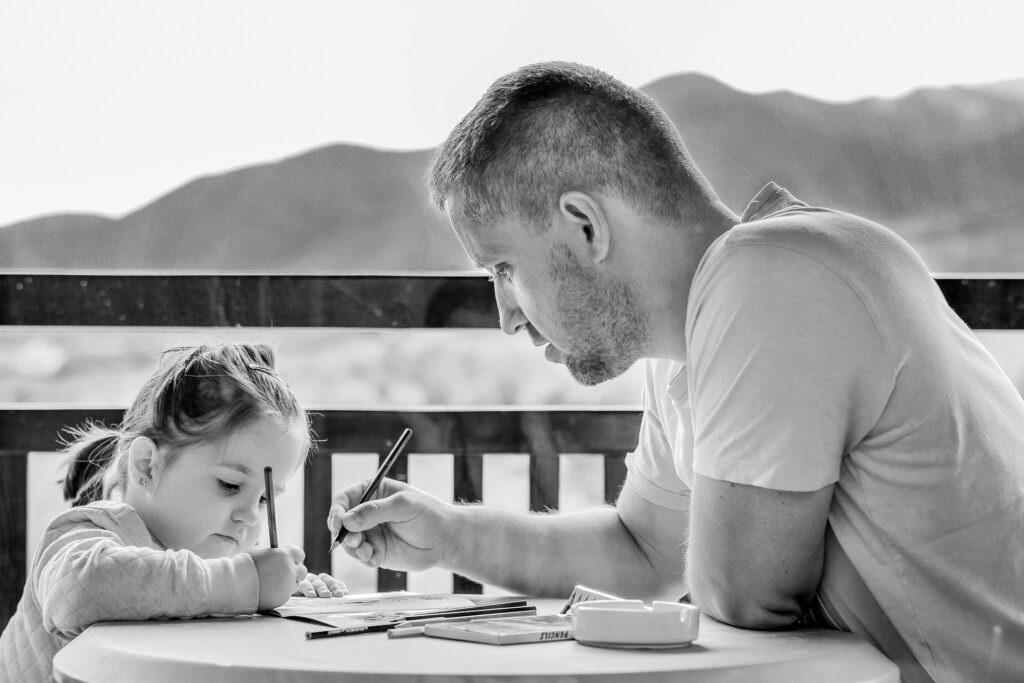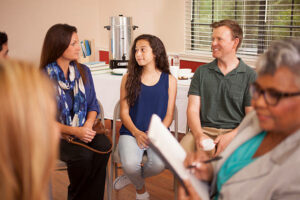Guest blog post by Ashley Wilkins, LCSW
Childhood is a time when children learn a fantastic amount of things in an extraordinarily short period of time. It is the time when they learn to understand and interact with their world. Unfortunately, it is also a time they can become fearful of their world. If your child is struggling with anxiety, he or she can learn to tame it, but it takes support and practice. If you’re wondering how to teach your child to cope with anxiety, then keep reading to learn six ways to get started.
My Experience with Childhood Anxiety
I remember being painfully shy as a young child, always worrying about things beyond my control. I’d get stomach aches that kept me home from school. My family was at a loss as to what could be “bothering me.”
 As a kid, I didn’t have the words to describe what I was feeling. As an adult and a therapist, I often reflect on what would have helped the younger me. I know it would have meant so much to my kid self to be able to put a name to what I was experiencing. To know that the constant worry I felt in the pit of my stomach when there was presumably nothing really wrong was something called anxiety.
As a kid, I didn’t have the words to describe what I was feeling. As an adult and a therapist, I often reflect on what would have helped the younger me. I know it would have meant so much to my kid self to be able to put a name to what I was experiencing. To know that the constant worry I felt in the pit of my stomach when there was presumably nothing really wrong was something called anxiety.
Well-meaning adults would often say to me, “It’s okay. There is nothing to worry about. Calm down. You’ll be fine!” But those words never helped calm me, and it never made anything feel fine. Those adults were well-intentioned and only trying to help. However, they didn’t understand what I was experiencing or know how to help. It was more than just temporary nerves or unease.
Childhood Anxiety
Anxiety is one of the most common psychiatric problems children face today and its occurrence is steadily rising each year. If your child is a worrier, always complaining of stomach aches (with no known medical cause), resisting certain activities or social engagements, or often asking “what if” questions, they may have childhood anxiety. Here’s how to teach your child to cope with anxiety.
Learn More: 9 Reasons Anxiety Disorders in Teens is On the Rise
How to Teach Your Child to Cope with Anxiety:
Some Worry is Okay
 Anxiety in some situations is normal and can even be positive. Our brains need anxiety to alert us to danger and keep us safe. Think of anxiety as a smoke alarm in your brain. When there really is a fire, you’re glad to have that smoke alarm to help keep you safe and escape the fire.
Anxiety in some situations is normal and can even be positive. Our brains need anxiety to alert us to danger and keep us safe. Think of anxiety as a smoke alarm in your brain. When there really is a fire, you’re glad to have that smoke alarm to help keep you safe and escape the fire.
However, for a person with an anxiety disorder, their smoke alarm is overly sensitive and goes off for little things, like burnt toast, for example. When it comes to managing anxiety, the trick is to help kids train their brains to learn the difference between burnt toast and an actual fire.
Acknowledge and Name the Feeling
We all experience worry or nervousness from time to time, but for an anxious child, it can be all-consuming. When your child is consumed with fear, try acknowledging how they’re feeling. A simple, “you’re feeling nervous right now,” can be powerful for a child to hear from you. Naming it gives them the word to match with the feeling.
Acknowledging the feeling shows them that their feelings are valid and vital, even if the thing they’re anxious about is not. Naming the feeling can help remove some of the power and intensity of it, allowing the anxious thought to move on and keep from building in intensity.
Related Reading: How to Recognize Social Anxiety Symptoms in Teens
Face Instead of Avoid
The most significant trick anxiety plays on us is presenting the impulse to avoid whatever we’re worried about. Anxiety makes us thing that we can make it go away if we just avoid it. Unfortunately, avoidance usually makes anxiety worse.
You’ve likely heard the common phrase, “face your fears.” Done right, this can be a very effective way to help your child manage their anxiety. If done right! While it’s not a good idea to throw your child into the deep end (so to speak), gradual and consistent exposure to the source of your child’s worry helps them master their worry and build resilience.
This general principle is the basis of one of the most effective anxiety therapy treatments out there: exposure therapy. According to the Child Mind Institute, exposure therapy works, because, “fear, like any sensation, diminishes over time, and children gain a sense of mastery as they feel the anxiety wane.”
Resist Reassurance
“It will be okay. Don’t worry. You’ll be fine.” While this may be true, resist the temptation to reassure your child this way. No one ever calms down simply because someone told them to – feelings don’t operate by a simple on/off switch.
Even though you know your child’s anxiety is making a mountain out of a molehill, try to see it from their perspective. Your child does not have your decades of life experience that have taught you that being nervous causes no lasting damage, and things will be alright. Your child simply doesn’t know that. And the truth is, their brains can’t hear it.
When we become emotionally dysregulated, the emotional center of our brain takes over, and it becomes nearly impossible to access the rational, logical parts of our minds. Attending to the feeling and acknowledging the worry without trying to fix it will be more effective than reassurance.
Try Mindfulness
 Research tells us that an effective method of reducing the intensity of anxiety is through the use of deep breathing and mindfulness techniques. This helps calm the nervous system that is put into the survival “fight, flight, freeze” mode when anxiety spikes.
Research tells us that an effective method of reducing the intensity of anxiety is through the use of deep breathing and mindfulness techniques. This helps calm the nervous system that is put into the survival “fight, flight, freeze” mode when anxiety spikes.
Try engaging your child in taking deep, slow breaths by having them imagine gradually filling their belly as if it’s a big balloon. Have them take several deep breaths, pretending to inflate and deflate the balloon slowly.
Other mindfulness techniques, like focusing on the five senses (What are five things you can see? Feel? Smell? Hear? Taste?), help ground your child in the present. This grounding interrupts negative thinking patterns by training the brain to observe without judgment and focus on what’s around you in the present moment. (Notice that anxiety is often future-focused – what if…?)
Related Reading: 12 Ways to Practice Mindfulness for Teen Anxiety
Seek Out Support
If your child is struggling and you want to learn more about how to teach your child to cope with anxiety, lots of support is available. There are also many helpful websites out there, like Coping Skills for Kids and Go Zenthat have lots of valuable information.
And you don’t have to do this alone. Therapy can be helpful to support your child and provide even more tools on how to best help your child in coping with anxiety. Talk to one of our qualified therapists today. If you’re in the Chicago area, we have offices in west suburban Glen Ellyn and Chicago’s Jefferson Park neighborhood. Contact us today by calling (630) 423-5935.
Ashley Wilkins, LCSW
Ashley Wilkins is a therapist at Life Care Wellness, a group psychotherapy practice in Glen Ellyn and Chicago (Jefferson Park neighborhood), Illinois. She has provided therapy in a variety of settings, including schools, hospitals, and community mental health centers. She works with adults, adolescents, children, and families, specializing in grief and loss, trauma, anxiety, depression, sexual abuse, parenting, and identity exploration.






